|
|
|
Sort Order |
|
|
|
Items / Page
|
|
|
|
|
|
|
| Srl | Item |
| 1 |
ID:
152917
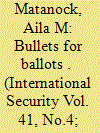

|
|
|
|
|
| Summary/Abstract |
Why does fighting recur following some civil conflict peace settlements, but not others? What kind of agreements are associated with more enduring peace? Post-conflict elections can often complicate and even undermine peace agreements. Agreements that contain “electoral participation provisions,” however, may help stabilize settlements and produce more enduring peace. Electoral participation provisions mandate that rebel groups be allowed to compete alongside the government in post-conflict elections. Such provisions encourage external actors, such as intergovernmental organizations and foreign donors, to become engaged in post-conflict elections. As part of this engagement, they can provide incentives to the parties to adhere to the terms of the settlement, as well as detect and sanction instances of noncompliance. New cross-national data suggest that conflict after peace settlements recurs less often when electoral participation provisions are included than when they are not. The data also suggest that this pacifying relationship holds when combatants expect international engagement.
|
|
|
|
|
|
|
|
|
|
|
|
|
|
|
|
| 2 |
ID:
155238
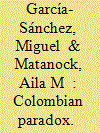

|
|
|
|
|
| Summary/Abstract |
Ending civil conflict is difficult, particularly through political settlements. Conflicts now often occur in states with elections, and voters have sometimes been directly involved in the process, potentially in efforts to overcome elite divisions. Yet, according to evidence from the 2016 popular plebiscite in Colombia, referendums and other tools of direct approval by voters seem to amplify elite divisions and therefore are not a useful mechanism to strengthen peace processes in this way. Focusing instead on traditional elite-led negotiations that seek to satisfy each faction may have a better chance of producing signed settlements, although the Colombian case also suggests some alternative forms of inclusivity that may help increase the overall legitimacy of the process and improve the odds of implementation.
|
|
|
|
|
|
|
|
|
|
|
|
|
|
|
|
| 3 |
ID:
160126
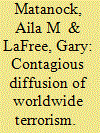

|
|
|
|
|
| Summary/Abstract |
Studies of the contagious spread of insurgency and conflict across national boundaries has generated a good deal of empirical research over time. While the contagious spread of terrorism has also been a policy concern, few empirical studies exist on the extent to which terrorism spreads contagiously. This article uses methods developed by criminologists to study the spread of crime to examine the worldwide diffusion of terrorism from 1970 to 2013. We distinguish between contagious increases (based on shared borders) and non-contagious increases (where no borders are shared). We define the “domino effect” as a particular type of contagious diffusion where high levels of terrorism spread to an adjoining country but also remain high in the host country. Our analysis shows that both contagious and non-contagious diffusion has been rare over the past 43 years, non-contagious diffusion is more common than contagious, and when contagious diffusion occurs, it is very likely to occur according to the domino effect.
|
|
|
|
|
|
|
|
|
|
|
|
|
|
|
|
| 4 |
ID:
190758


|
|
|
|
|
| Summary/Abstract |
To what extent are legislators, responsible for the implementation of many peace agreements, responsive to citizens’ preferences? Examining the 2016 Colombian peace agreement, we embed an experiment in the 2019 wave of a survey of all the members of Congress. We inform legislators about the attitudes of the general population and residents of conflict-affected regions on a provision included in the peace agreement: the creation of 16 special seats in the House of Representatives reserved for conflict areas. We find that legislators underestimate citizen support for this policy, and the magnitude of their misconception is correlated with the positions of their parties on the issue. Moreover, we find that providing information about citizens’ support for the policy does not affect legislator support for the provision.
|
|
|
|
|
|
|
|
|
|
|
|
|
|
|
|
| 5 |
ID:
161436
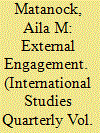

|
|
|
|
|
| Summary/Abstract |
When do settlements to civil conflict bring former combatants into normal politics as political parties? Prior work shows that electoral-participation provisions in settlements correlate with enduring peace; such provisions help end some of the longest and deadliest civil conflicts. But they are not always included in negotiated settlements. This article presents original data showing that no settlements included electoral-participation provisions until the end of the Cold War. Since then, they appear in almost half of all settlements. What explains this pattern? I argue that combatants include electoral-participation provisions to engage international actors; through these provisions, international actors can often enforce negotiated deals by monitoring and providing incentives conditioned on combatant compliance. This helps to overcome commitment problems that often prevent peaceful settlements of civil conflicts. An analysis of data on civil conflicts and settlements since 1975, as well as illustrative case evidence, provides support this argument.
|
|
|
|
|
|
|
|
|
|
|
|
|
|
|
|
| 6 |
ID:
161314
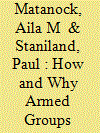

|
|
|
|
|
| Summary/Abstract |
Armed actors are often involved in electoral politics, from the fusing of ballots and bullets in armed political parties to insurgents covertly backing politicians. We develop new concepts and theory to better understand these complex relationships between violent actors and democratic practice. We first offer a novel conceptualization of armed groups’ electoral strategies that systematically maps out variation in the organizational directness and public openness of groups’ involvement in elections. We then use comparative case studies to develop theory about the conditions under which each of these electoral strategies is most likely, and what can trigger changes between them. The interaction of armed groups’ power and expectations of popular support with governments’ policies of toleration or repression determines the strategies of electoral participation that groups pursue. These concepts and arguments lay the foundation for a systematic research agenda on when and how “normal” and armed politics become intertwined.
|
|
|
|
|
|
|
|
|
|
|
|
|
|
|
|
| 7 |
ID:
148483
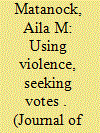

|
|
|
|
|
| Summary/Abstract |
In many cases, including some of the most destructive civil conflicts and some of the newest emerging democracies, militant and ex-militant groups form political parties to participate in elections. Despite the prevalence of such electoral participation, it has rarely been studied, and scholars have not explored its influence on outcomes such as conflict or democratization. A lack of comprehensive data has impeded this research. The dataset introduced in this article provides annual data on militant and ex-militant group participation in legislative elections between 1970 and 2010. The Militant Group Electoral Participation (MGEP) dataset allows for further empirical study of the patterns, causes, and consequences of this behavior. Moreover, in combination with other datasets, MGEP stands to provide additional insights on conflict, peace, democratization, and electoral politics more broadly. In this article, I describe MGEP, provide summary statistics on the data, and show its applications, including through a replication study on post-conflict elections.
|
|
|
|
|
|
|
|
|
|
|
|
|
|
|
|
|
|
|
|
|